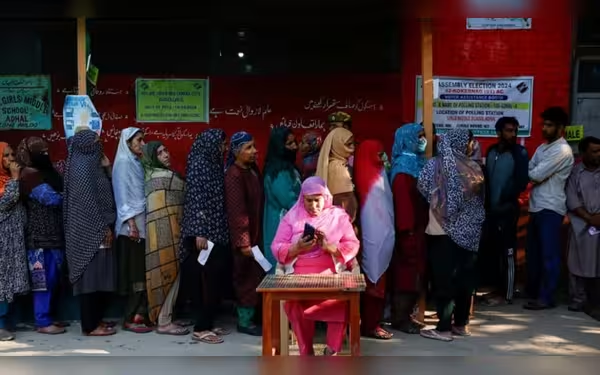Saturday, November 16, 2024 05:34 PM
Jammu and Kashmir Regional Elections Enter Second Phase
- Voter enthusiasm surges in Jammu and Kashmir elections.
- Unemployment remains a critical issue for local youth.
- International diplomats observe the electoral process.
 Image Credits: channelnewsasia
Image Credits: channelnewsasiaJammu and Kashmir's regional elections see high voter turnout and economic concerns amid significant political changes.
In a significant political event, voters in the Indian-administered Jammu and Kashmir are participating in the second phase of regional elections, which commenced on September 25. This election marks a pivotal moment for the region, as it is the first in a decade and follows the revocation of its semi-autonomous status five years ago. The atmosphere surrounding these elections is notably different from previous years, with political observers noting a surge in voter enthusiasm and participation.
The high voter turnout in the first phase of the polls is a clear indicator of this enthusiasm. Many residents are now exercising their right to vote without the fear of intimidation from militants or separatists, a stark contrast to the past. This newfound willingness to participate is also a form of protest against ongoing economic challenges, including soaring inflation and a perceived loss of autonomy. Local citizens are using their ballots to voice their concerns and aspirations for a better future.
Since the Indian government, led by Prime Minister Narendra Modi, revoked Jammu and Kashmir's special status in 2019, the region has undergone significant changes. The government argued that this move would enhance economic growth and reduce separatism. While some believe that security has improved, analysts point out that clashes between the Indian army and militants continue in areas that were once peaceful. Many locals are now advocating for the reinstatement of statehood, believing that it would lead to better economic conditions and more job opportunities.
Unemployment remains a pressing issue, particularly among the youth, with approximately one-fifth of the young population in the region currently jobless. Local resident Mohammad Shahkar expressed the community's desire for more jobs and investments, stating, "More jobs and investments – what was promised – should come so that more businesses, factories, industries and schools are set up, which will employ people to a greater extent. That is the core issue." Another resident, identified only as Shoaib, echoed this sentiment, highlighting that unemployment has been a long-standing problem, not solely a consequence of recent political changes.
Despite government claims of economic growth, with an 8 percent increase reported for the 2022-2023 financial year, many local businesses are struggling. The tourism sector, which has seen a rise in visitor numbers, is not translating into increased sales for local artisans. Mohammad Adil Shah, a shop owner in Srinagar, lamented, "We’ve been waiting for a long time for our business to improve. We hope that more tourists come here, shop and buy from us, but so far that’s not happening. Our business is zero right now." Meanwhile, Mohammad Nayeem Mir, who runs a manufacturing business, noted that despite improvements in the environment, local businesses have yet to benefit significantly from the changes.
As the elections unfold, both the ruling Bharatiya Janata Party (BJP) and the opposition INDIA coalition, led by Rahul Gandhi's Congress party, are vying for influence in the region. The stakes are high, with both parties' regional leaders contesting the polls. Analysts suggest that this election is not only crucial for the political landscape but also an opportunity for the BJP to demonstrate its commitment to free and fair elections in a region known for its heavy militarization.
In a bid to showcase transparency, diplomats from 20 countries, including the United States and Germany, have been invited to observe the voting process. However, some nations have previously declined, citing concerns over the nature of the visit. Experts believe that these diplomatic observations could lend credibility to the government's claims of normalcy returning to Jammu and Kashmir.
As the second phase of the elections progresses, the outcome will likely have lasting implications for the region's political and economic future. The voices of the voters, now more empowered than ever, will play a crucial role in shaping the path ahead. The hope for a brighter future, marked by economic stability and job creation, resonates strongly among the residents of Jammu and Kashmir, making this election a pivotal moment in their ongoing journey.













